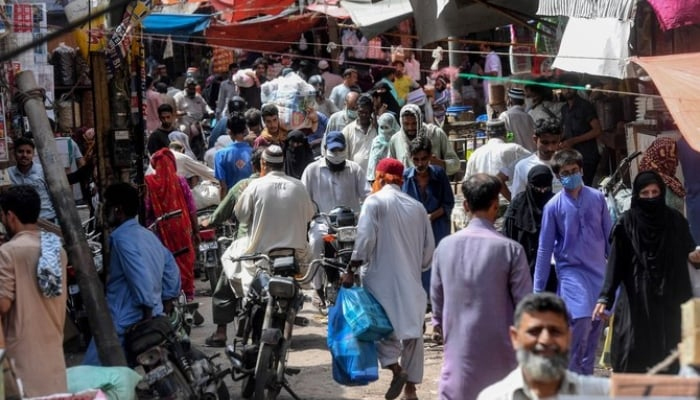Make population a manifesto promise
Here are some figures that should concern anyone vying for office in today’s Pakistan: the country’s population according to the most recent census stands at almost 250 million people; Pakistan’s fertility rate is more than three per cent, which is 150 per cent more than the world average; 2.2 million pregnancies every year are aborted in the country due to little or no family planning; and only 34 per cent of Pakistanis use any form of contraception, a number that is lower by leaps and bounds when compared to other countries even within our region. Needless to say, these are scary numbers for a country that is barely able to sustain its own weight as it stood decades back. With the year 2050 promising to take us to 400 million if we continue on the same path, emergency-level efforts are required to finally convince policymakers and people both that population planning is not a taboo to be brushed under the carpet. The fact is that Pakistan stands at a critical juncture where the burgeoning demographic poses a threat to sustainable development. Addressing this will require a multifaceted approach that goes beyond conventional methods. The demographic explosion places immense pressure on the country’s limited resources, ranging from education and healthcare to water and energy.
Pakistan has over the years taken steps – or at least tried – to implement family planning programmes but their effectiveness has been inconsistent. A more nuanced and dynamic approach is required to tackle the roots of this demographic challenge. One crucial avenue for curbing population growth lies in investing in education. Pakistan must prioritize accessible and quality education, especially for women. Then comes effective healthcare, which is pivotal in addressing population growth. Accessible healthcare facilities, particularly in rural areas, can contribute significantly to family planning. The government needs to invest in healthcare infrastructure, ensuring that basic maternal and child health services are available to all. Additionally, family planning services should be integrated into the healthcare system, making contraceptives readily available and dispelling myths surrounding their use. Socio-economic development too plays a crucial role in population control. Poverty often correlates with higher birth rates as families may view children as additional hands to contribute to household income. Microfinance programmes and skill development initiatives can empower communities, fostering economic independence and consequently influencing family planning decisions.
None of this can happen, however, without buy-in by political parties. How are we to ensure any of this happens if the party or parties in power don’t bother with the enormity of the challenge before them? This becomes all the more important after the 18th Amendment which devolved many subjects to the provinces, making it essential for all of Pakistan’s political actors to care about the out-of-control population situation. One way political parties can show that they mean it when they talk a big game about population planning is by asking them to make population control and family planning a manifesto promise. A cursory look at the 2018 election manifestos by almost all political parties shows that, where some didn’t even bother mentioning the population growth challenge, those that did had not seen it as a separate subject. This needs to change. We need a manifesto promise by our political parties: family planning and population control as a separate subject that they see as a serious concern – a ministry that is not just activated on World Population Day but is actively working to ensure the delivery of family planning initiatives. Addressing Pakistan’s population challenge requires a cultural shift, and political as well as community engagement is instrumental in achieving this. We ask our political parties: make population control a manifesto promise – now.
-
 Kim Kardashian And Lewis Hamilton Make First Public Appearance As A Couple At Super Bowl 2026
Kim Kardashian And Lewis Hamilton Make First Public Appearance As A Couple At Super Bowl 2026 -
 Romeo And Cruz Beckham Subtly Roast Brooklyn With New Family Tattoos
Romeo And Cruz Beckham Subtly Roast Brooklyn With New Family Tattoos -
 Meghan Markle Called Out For Unturthful Comment About Queen Curtsy
Meghan Markle Called Out For Unturthful Comment About Queen Curtsy -
 Bad Bunny Headlines Super Bowl With Hits, Dancers And Celebrity Guests
Bad Bunny Headlines Super Bowl With Hits, Dancers And Celebrity Guests -
 Insiders Weigh In On Kim Kardashian And Lewis Hamilton's Relationship
Insiders Weigh In On Kim Kardashian And Lewis Hamilton's Relationship -
 Prince William, Kate Middleton Private Time At Posh French Location Laid Bare
Prince William, Kate Middleton Private Time At Posh French Location Laid Bare -
 Stefon Diggs Family Explained: How Many Children The Patriots Star Has And With Whom
Stefon Diggs Family Explained: How Many Children The Patriots Star Has And With Whom -
 ‘Narcissist’ Andrew Still Feels ‘invincible’ After Exile
‘Narcissist’ Andrew Still Feels ‘invincible’ After Exile -
 Shamed Andrew ‘mental State’ Under Scrutiny Amid Difficult Time
Shamed Andrew ‘mental State’ Under Scrutiny Amid Difficult Time -
 Bad Bunny's Super Bowl Halftime Show: What Time Will He Perform Tonight?
Bad Bunny's Super Bowl Halftime Show: What Time Will He Perform Tonight? -
 Where Is Super Bowl 2026 Taking Place? Everything To Know About The NFL Showdown
Where Is Super Bowl 2026 Taking Place? Everything To Know About The NFL Showdown -
 Chris Pratt Explains Why He And Katherine Schwarzenegger Did Premarital Counseling
Chris Pratt Explains Why He And Katherine Schwarzenegger Did Premarital Counseling -
 Drake 'turns Down' Chance To Hit Back At Kendrick Lamar At Super Bowl
Drake 'turns Down' Chance To Hit Back At Kendrick Lamar At Super Bowl -
 Sarah Ferguson Had A ‘psychosexual Network’ With Jeffrey Epstein
Sarah Ferguson Had A ‘psychosexual Network’ With Jeffrey Epstein -
 Miranda Kerr Shares The One Wellness Practice She Does With Her Kids
Miranda Kerr Shares The One Wellness Practice She Does With Her Kids -
 Czech Republic Supports Social Media Ban For Under-15
Czech Republic Supports Social Media Ban For Under-15




